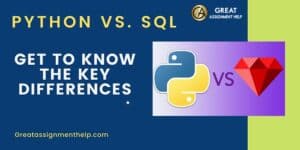If you are a computer science student, then you may have to update your knowledge of Python and SQL. Many students often get confused about these languages. Python is a scripting language whereas SQL is a query language that serves different purposes. If you want to know more about the differences between Python and SQL, then this blog will be more helpful to you. In specific, for your comprehension, here, we have presented a comparative analysis of Python vs. SQL with some examples. Continue reading to expand your knowledge.
What is Python?
Python is a scripting language that is written in ANSI C. Hence, it can be compiled and executed on any operating system. Python is a general-purpose programming language that allows data experimentation and is used for the development of various mobile applications, web applications, artificial intelligence, etc.
When compared to other programming languages such as C++ and Java, many programmers consider Python to be a more powerful language because of its features and ability to extend. Even Python helps to practically develop anything with appropriate tools and libraries; therefore, it is called one of the finest programming languages. In general, Python is a readable, elegant, and easy-to-learn programming language.
See Also – Top Python Interview Questions For Beginners and Experienced
As Python is simple to learn, many programmers prefer to use this language for their projects. In specific, Python allows programmers to efficiently work and integrate systems, making them more vibrant and demandable. It is a high-level programming language that has vast real-world applications.
Python’s syntax is simple and readable. Hence, programmers can easily code with minimum lines. A few more characteristics that make Python an interesting language for effortlessly creating websites and mobile applications are built-in data structures, frameworks, libraries, and community support.
What is SQL?
A Structured Query Language (SQL) is a query language that is used to communicate with databases. Before jumping into SQL, first, you should understand what a Database Management System (DBMS) means.
DBMS is a software program that stores and retrieves data for users with proper security. It is nothing but a collection of application programs that work with databases. With the help of DBMS, users can develop their databases. Generally, DBMS serves as a connection between the data and the software program. Some popular database management systems include MySQL, Oracle, IBM DB2, Microsoft Access, SQLite, Microsoft SQL server, MariaDB, dBASE, and PostgreSQL.
Also, See – C Sharp and Sequel Programming Languages For Beginner’s
In a database system, multiple databases can be created and within each database, multiple tables can be created to store and manage various types of data. Mainly, to create, insert, update, delete, or do any other modifications within databases, you can use SQL. SEQUEL programming language or SQL is a language that is mainly used to interact with databases. MySQL, SQLite, and PostgreSQL are some common types of databases that support SQL.

Python vs. SQL: Pros and Cons
Find here, the pros and cons of Python and SQL.
Pros of Python
- Free and Open-Source Language
- Easy to Read, Learn and Write
- Interpreted Language
- Dynamically Typed
- Improved Productivity
- Supports Vast Libraries
- Portable
Cons of Python
- Slow Speed
- Weak in Mobile Computing
- Not Memory Efficient
- Database Access
- Contains Runtime Errors
Pros of SQL
- Quick Query Processing
- Multiple data views
- Standardized Language
- Highly Interactive
- Portable
Cons of SQL
- Expensive
- Complex Interface
- Partial Control
SQL vs. Python: Benefits
Python and SQL each have their own set of advantages. SQL was designed to store, retrieve, and manage data. Most importantly, SQL lets you combine data from multiple tables in a database. However, SQL cannot be used to perform higher-level data transformations and manipulations, such as regression tests and time series.
Pandas a Python-specific package is more efficient at data analysis. As a result, you can edit structured data with Python and retrieve data with SQL.
Python vs. SQL: Major Differences
Let’s take a look at the most important difference between Python and SQL right now.
- SQL is a query language for managing data storage systems, whereas Python is a high-level programming language with numerous applications.
- Python is one of the programming languages that the majority of IT companies use frequently these days. However, SQL is one of the most important programming technologies for managing databases in online businesses.
- High-end computer programs and applications like consumer apps, business tools, and industrial automation systems are all made with Python. Databases that store and retrieve data are built with SQL.
- Python comes with a large library of functions. As a result, it is capable of several operations. There are no libraries in SQL. SQL is made up of many sublanguages that can be used to manipulate data instead of libraries.
- The majority of IT companies are switching from older languages to Python. As a result, the number of applications is rapidly and exponentially growing. SQL and its variants are used by every computer and web-based business. Additionally, SQL is a very effective growth tool for businesses.
Which is Easier to Learn- Python or SQL?
Python is more difficult to learn than SQL. Although Python has grammar, several coding concepts, and rules, it is easier to read and comprehend. However, SQL is a straightforward language with only a few sets of simplified queries and fundamental database-related operations that anyone can learn more quickly. SQL’s syntax is simpler to use and comprehend than Python’s. However, as a tool, SQL is more difficult to use than Python scripting.
Python vs. SQL: A Comparison Table
The table below will display the major differences between Python and SQL.
| Parameters | Python | SQL |
| Definition | Python is a high-level general-purpose programming language used for web development, data analytics, prototyping, and other tasks related to technology. | SQL is an open-source relational database management system that anyone can download and use. |
| Library | It contains numerous libraries. | It does not contain a library. |
| Versions | Python 2, Python 3 | MySQL, PostgreSQL, SQLite |
| Ease of Learning | High coding scope, versatile, and productive. | Easy to learn. |
| Compatible with | All the websites are available on the Internet. | Mobile and desktop applications. |
Python vs. SQL: Example
Assume that you have a database table named ‘universities’ with data about millions of colleges. Particularly, the table contains separate fields to store information such as Name, City, address, fee structure, contact information, and so on of each college.
Now, let us see how to query this dataset using SQL.
SELECT* FROM universities.
This query will help you to retrieve data related to all colleges present in the table.
SELECT* FROM universities LIMIT 10.
This query will help you to retrieve the first ten colleges in the table.
SELECT Name FROM universities WHERE City = ‘Delhi’.
This SQL statement will retrieve the names of all the colleges located in Delhi.
Till now, we have seen data retrieval using SQL. Next, let us have a look at how to extract the same set of information in Python using ‘Pandas.’
All Colleges: Universities
First ten Colleges: Universities. head(10)
Colleges in Delhi: Universities [universities.City = = ‘Delhi’].Name
In the example presented above, you can notice that the two languages are somewhat similar. However, for complicated queries, the pattern will differ.
Also read: LUA vs. Python: A Comparative Study
Conclusion
Hopefully, by now, you will have learned the basics of Python vs. SQL. In general, for a programmer, knowledge of both languages is essential. But SQL is more suitable for relational databases only. Moreover, to increase the object-oriented capability of SQL, many features have been added to it. On the other hand, Python is a flexible programming language that contains a wide range of libraries to perform several functions.


